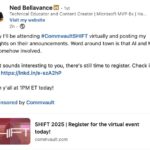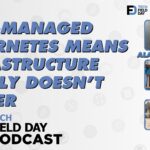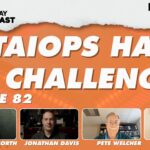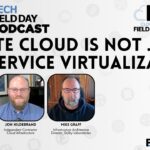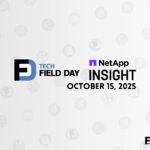AI has driven your datacenter designs and is now moving outwards through your whole network. This episode of the Tech Field Day podcast features Lee Peterson from Cisco discussing AI and networks with Andy Banta, Jack Poller, and Alastair Cooke. The discussion explores how AI is “escaping the data center” and becoming pervasive across the network, necessitating a dual focus on “networking for AI” and “AI for networking.” The former involves building robust, high-performance, and secure infrastructure, particularly at the edge, to support AI workloads like real-time inference. The goal is to support new applications such as robotics, fraud detection, and small language models, moving beyond traditional cloud-centric deployments to a more federated model. The latter leverages AI to manage, optimize, troubleshoot, and secure the network itself, with Cisco utilizing deep network learning models, historical data, and expertise to create AI assistants that enable intent-based networking and streamline operations. Additionally, the conversation emphasizes the critical role of advanced security, including hardware-accelerated post-quantum cryptography, to protect data in this evolving, AI-driven environment from future decryption threats.
Billion-Dollar AI Headlines Obscure Real Business Value
The big headlines that we’re seeing around the massive funding of large AI companies are a distraction from the reality that AI is being built and used in business applications. This episode of the Tech Field Day podcast features Frederic Van Haren, Chris Grundemann, Brian Martin, and Alastair Cooke reflecting after AI Infrastructure Field Day in Santa Clara. Popular news often covers the creation of large, general purpose AI models, yet the real-world application of AI through inference is where most companies see a return on their investment. Similarly, the common understanding of “AI” is as a single topic, without a more granular view that differentiates between rules-based systems, traditional machine learning, and emergent generative models like Large Language Models (LLMs). Specialized AI models will be vital for cost-effective applications with enhanced efficiency and the integration of diverse AI capabilities into agentic architectures. Advanced security protocols and regulatory frameworks are vital to mitigate novel vulnerabilities, organizations must adapt to an extraordinarily rapid pace of technological evolution. AI has already had a profound impact on software development, potentially enabling widespread custom application creation.
AI Needs Resource Efficiency
As we build out AI infrastructure and applications we need resource efficiency, continuously buying more horsepower cannot go on forever. This episode of the Tech Field Day podcast features Pete Welcher, Gina Rosenthal, Andy Banta, and Alastair Cooke hoping for a more efficient AI future. Large language models are trained using massive farms of GPUs and massive amounts of Internet data, so we expect to use large farms of GPUs and unstructured data to run those LLMs. Those large farms have led to scarcity of GPUs, and now RAM price increases that are impeding businesses building their own large AI infrastructure. Task-specific AIs, that use more efficient, task-specific models should be the future of Agentic AI and AI embedded in applications. More efficient and targeted AI may be the only way to get business value from the investment, especially in resource constrained edge environments. Does every AI problem need a twenty billion parameter model? More mature use of LLMs and AI will focus on reducing the cost of delivering inference to applications, your staff, and your customers.
Cutting-Edge AI Networking and Storage Kick Off 2026 at AI Infrastructure Field Day 4
We’re kicking off 2026 with one of our most popular events, AI Infrastructure Field Day 4, running from January 28th through January 30th. The event will stream live on LinkedIn, Techstrong TV, the Tech Field Day website, and for the first time ever, on our YouTube channel, offering a front-row view of the latest in […]
Modern Data Mobility is Challenging the Laws of Physics with Hammerspace
Modern data mobility is challenging the laws of physics; the speed of light is a fundamental limit for moving signals. This episode of the Tech Field Day podcast features Kurt Kuckein from Hammerspace discussing data movement and management with Jim Jones, Jack Poller, Andy Banta, and Alastair Cooke. The challenge is that the distributed nature of data, spread across the globe, creates significant obstacles for AI, particularly regarding the speed of light and power consumption. We delve into overcoming these limitations through technologies that facilitate data access and movement, touching on concepts such as efficient storage solutions (Open Flash Platform), the importance of centralized data management, and the agility required for evolving AI workloads. While the underlying principles of data management are not new, the scale and complexity of AI necessitate innovative approaches to ensure data can be accessed and utilized effectively, regardless of its physical location.
Tech Field Day Takeaways for 2025: Making AI Less Manic
2025 was the year of AI Mania. Everyone wants you to know where they stand with AI in their product. Tech Field Day has a different approach. In this special year end episode, Tom Hollingsworth, Stephen Foskett, and Alastair Cooke look back at the discussions and deep dives into AI and how Tech Field Day grounded them all in practical real terms. Our event leads discuss the boring reality of AI tools and how AI has a dual nature that must be understood to get real value. They also debate the changing landscape of security where AI is concerned, including the importance of data sovereignty. They wrap up with a focus on the fundamentals and how Tech Field Day continues to make those important for the community at large.
Generative AI Coding Tools Make Enterprise Applications Worse
AI is writing a large proportion of modern software and Generative AI coding tools make enterprise applications worse. This episode of the Tech Field Day podcast looks at AI generated applications with Calvin Hendryx-Parker, Jim Czuprynski, Jay Cuthrell, and Alastair Cooke. Satya Nadella says that up to 30% of the code Microsoft writes is AI generated, AWS is at about 25% AI generated code. We ponder whether there is a link between this AI generated code and the quality of the Windows 11 codebase, possibly even the recent AWS outage? Calvin has hands-on experience with a range of AI coding tools, finding he uses different AI tools for specialist tasks in his development projects. The easy task for AI coding is translating existing applications from one platform version to another, or rewriting existing application code in new languages. Both these tasks are onerous for human developers and ideal for an AI assistant. The unanswered question is whether generative AI tools can handle creating new functionality in enterprise applications, can AI fulfill the role of the senior developer or software architect?
Simplification of IT is Really an Illusion
Simplification in IT is an illusion; increasing complexity outpaces every effort to simplify. This episode of the Tech Field Day podcast, recorded on-site at Cloud Field Day 24, features Camberley Bates, Nathan Nielsen, Guy Currier, and Alastair Cooke. Cloud services and centralized management platforms offer simplified interfaces but also introduce a multitude of choices and underlying complexities. History matters; advancements from mainframes to PCs demonstrate continuously shifting goalposts, while the more recent integration of cloud and AI contributes to increased complexity. It may be that AI brings simply advanced simplicity, yet it may also bring the unintended consequence of people becoming “ignorant” of how IT works. CIOs and CTOs need to think strategically to manage increasingly complex environments, striking a balance between patchwork fixes and long-term strategic approaches.
Commvault Shift 2025 Live Blog
Join us for our coverage of Commvault Shift with our Live Blog! Tune in now to see what our delegates are saying.
DNS Must Be Secured Presented by Infoblox
DNS security is no longer optional. This service is not only being attacked by nefarious actors but it is also being leveraged in ways to compromise users and exfiltrate data. In this episode of the Tech Field Day podcast, brought to you by Infoblox, Tom Hollingsworth is joined by Jack Poller and Cricket Liu. They talk about the historical openness of DNS and how that has led to it becoming easy to see what users are doing and create ways to manipulate them. They discuss ways to secure the protocol and how companies like Infoblox are extending the capabilities for future security.
Well Managed Kubernetes Means Infrastructure Finally Doesn’t Matter
In a world of well-managed Kubernetes, we hoped that infrastructure finally wouldn’t matter. This episode of the Tech Field Day podcast features John Willis and Guy Currier wishing that infrastructure didn’t matter, with Alastair Cooke. Every new infrastructure revolution claims to make infrastructure invisible, from virtualization through HCI and cloud to containers and Kubernetes. The reality has always been that these revolutions shift the definition of infrastructure and bring some new aspect to be managed. Developers building features and applications want to focus on satisfying some business need, not considering storage devices and network configurations. Virtualization and Kubernetes both made delivering infrastructure easier, but neither eliminated infrastructure architecture and management. The dream of self-deploying and self-organizing infrastructure is as distant as it ever was. Agentic AI is the latest new hope to eliminate infrastructure challenges, yet it brings its own complex infrastructure requirements. Will we ever stop caring about IT infrastructure?
NetAIOps Has Its Challenges
The industry has embraced AI for every possible problem. Operations will eventually embrace it as well but questions remain about how it will be implemented. In this episode, Tom Hollingsworth sits down with Pete Welcher, Rita Younger, and Jonathan Davis to discuss the issues that remain with implementing AI into an operations workflow. They discuss licensing and procurement, the need for institutional knowledge, and how this will all work in a multivendor world. They wrap up with some guidance about how to approach your next big AIOps project.
Ready or Not, AI is Coming to the Enterprise
Despite widespread skepticism, AI is already widely used in the enterprise, often in the form of so-called shadow applications outside traditional IT. This episode of the Tech Field Day Podcast, recorded on the eve of AI Field Day, features delegates Ryan Booth and Dave Graham discussing the real state of AI adoption in the enterprise with host Stephen Foskett. Just like the advent of the PC, generative AI is widely used across businesses, typically on a bring-your-own basis rather than as a coordinated effort by the IT department. The same process happened in the Software-as-a-Service world, where each department and even individual adopted multiple tools that met their needs. There will soon be a reckoning, where businesses try to get their hands around all of the AI applications being used across the enterprise. The next step is to develop a plan to control sprawl of tools, models, data, and subscriptions to ensure that this shadow AI doesn’t become a risk to the company. Then companies need to be prepared as AI agents become critical to their operations, likely also deployed by individuals without corporate control.
Exploring the Future of Enterprise AI Deployment and Innovation at AI Field Day 7
Join Tech Field Day, Techstrong, Futurum, and our panel of independent experts for AI Field Day 7, live October 29th and 30th, 2025. Watch live on Techstrong TV, LinkedIn, and the Tech Field Day website, where you can also view the full schedule.
Private Cloud is Not just Self-Service Virtualization
Private cloud is not just virtualization 4.0, self-service VM deployment doesn’t fulfil the same need as the Public Cloud. This episode of the Tech Field Day podcast features Mike Graff, Jon Hildebrand, and Alastair Cooke. Private cloud has evolved from simple virtualization to a more comprehensive, cloud-like experience, emphasizing the need for on-premises infrastructure to offer the same developer-friendly tools and APIs as public clouds. Some application repatriation is driven by cost concerns and enabled by rise of technologies like Kubernetes and OpenShift for managing containerized workloads. A unified control plane for hybrid cloud environments is vital, as is accurate cost accounting for on-premises resources. Enterprises will search for a hybrid approach where developers can deploy applications without needing to worry about the underlying infrastructure.
The Evolution of Cloud at Cloud Field Day 24
Cloud Field Day 24 is back in San Francisco on October 22nd and 23rd, bringing the brightest minds in enterprise cloud together for two days of innovation, insight, and live demos.
Tech Field Day Experience at NetApp Insight 2025 Keynote Live Blog
Learn more about NetApp Insight 2025 during the Keynote in our delegate live blog!
















